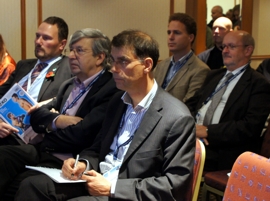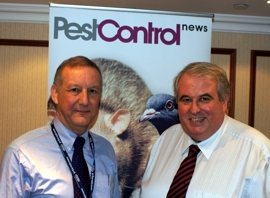Does the European pest control service industry need a voluntary standard or would a mandatory system serve it better? That was the subject for the 2011 Pest Control News Workshop held at PestTech on 2 November.
Like it or not, the European pest management industry is developing a standard for pest control servicing. To do this it is working with CEN – the European Committee for Standardisation, which is a co-ordinating body for the 31 individual national standards institutes in Europe (such as the British Standards Institute or BSI).
The PCN workshop wasn’t about whether or not there should be a standard but more about what form the standard should take. And, judging by the numbers that turned up, that’s an issue of interest to many in the industry.
| Prominent in the audience was what can only be described as, the European pest control establishment. This included from the UK Simon Forrester (BPCA), Roland Higgins, CEPA’s (the Confederation of European Pest Management Associations) director general, together with several of the CEPA executive. Representing the French association was Bertrand Montmoreau, from The Netherlands was Birt Speirings and, all the way from Malta, Ronnie Galea.
Chris Suter spoke first. Chris is director for qualifications at RSPH and chair of the BSI committee UK SVS/14, which is charges with putting forward the UK’s proposals. He also attends, on behalf of the UK, the meetings of the European Group producing the standard. In his summary of the current position Chris explained the different types of standards -statutory as in the Gas Safe standard,customer driven as in the British Retail Consortium (BRC) standard, which pest controllers working in the food industry will be familiar with, andvoluntary such as the Fairtrade initiative. He explained how the CEN standard will fit into the voluntary category and that it will apply to companies, not individuals. He also emphasised the fact that all of this has nothing to do with the EU – it’s an industry-led project, not a Brussels initiative. Interestingly, he also highlighted the concerns in other countries and, in particular, in France, Malta and Germany where standards already exist and, in all likelihood, will have to be lowered to meet the CEN standard. Once the CEN is agreed it will apply across the whole of Europe and any existing national standards will be replaced by it. Chris outlined his belief that the CEN will allow good pest control businesses to distinguish themselves from their competitors, giving them a competitive edge. He also dismissed the fear that the standard would favour the big boys. “On the contrary,” he suggested, “the bigger and more complex the organisation, the more difficult it will be for them to achieve the standard.” |
|
|
|
He also suggested that it was likely that smaller businesses would be exempt from some parts of the standard and pointed out that it was not the intention to make this a huge form filling exercise. Killgerm’s Jonathan Peck spoke next and, playing devil’s advocate, raised many of the questions in pest controllers” minds. Whilst supporting anything that raised standards in the industry, he asked will smaller firms be able to afford it? How will it deal with franchising firms, where the parent company might hold the standard but the franchisees may fall short? Will CEN actually improve standards or just increase the paperwork? Will perfectly good pest control businesses delivering quality pest control lose business, not because their work is poor, but just because they don’t hold the CEN? Wouldn’t it be better to have a mandatory system and therefore a level playing field across Europe? A number of key points were then made from the floor. John Davison, NPTA, raised his members concerns that the CEN standard will be for companies and not individuals. He felt that, as it is the individual pest technicians who do the work, then surely it should be individuals who are asked to meet the standard. A number of pest controllers, who described themselves as ‘smaller businesses’, agreed with Jonathan’s point that a mandatory system would be better. They had no argument with a standard but were concerned that a voluntary system wouldn’t do anything to rid the sector of the cowboys. Unfortunately, as Chris Suter eloquently pointed out: “A mandatory system is not within my gift or the gift of CEN.” Whilst the UK industry could lobby the UK government for a mandatory version of CEN to be introduced once the standard is produced, they are likely to be wasting their time. The ‘problem’ is the UK pest control industry has too good a safety record. The mandatory Gas Safe, and before it the CORGI standard, was only introduced in response to a public outcry after major safety incidents. The UK government is extremely unlikely to legislate without such major health and safety concerns. So the CEN will be a voluntary standard and in all likelihood is going to remain voluntary for some time. If that makes you think ‘why are we bothering?’, Andy Adams, Chairman of the CEFIC/EBPF Biocides Working Group, who was also present, had a convincing reply. His view was that over the longer term the Biocidal Products Directive is likely to produce a regulatory requirement for a standard. By developing its own standard now the industry will ensure it has a workable system which the regulators can simply adopt rather than imposing their own system, one developed by bureaucrats who know nothing of the industry. |
||





